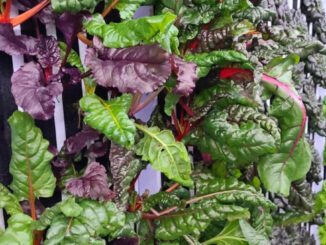
Cheney’s Mindful Me Farms harnesses the power of hydroponics to grow produce ‘richer than you buy at the store’
Mindful Me Family Hydroponics | Roberta Simonson |
IMAGE: Trish Gainer looks to place a hydroponic growing tower containing lettuce seeds inside a shipping container Tuesday near Cheney, Wash. (DAN PELLE/THE SPOKESMAN-REVIEW)
From the outside, one would think the Gainer family has a train car in their front yard. Inside the small structure, it looks and feels like the set of a sci-fi film.
Jessica Gainer, 34, uses hydroponics, a futuristic growing technique that involves neither soil nor sunlight, to generate 3 acres worth of fresh produce within the confines of a 320-square-foot space. From her container farm, Gainer runs Mindful Me Farms, selling fresh produce and other products.
Gainer’s plants, a variety of lettuces, microgreens and herbs, grow vertically on panels suspended from the ceiling. The facility uses gravity and tubes running along the top of the panels to distribute a nutrient-water solution to the greenery.
Gainer grows and sells “on average, about seven different lettuces and soon-to-be 10 different herbs.”
“I want to have different varieties for people, because sometimes people, they have their preferences. I’ve had arugula in here, butter head, oak leaf, gem, kale,” Gainer said.
LED lights covering several walls and lining the ceiling provide a substitute for the sun, running on an artificial cycle of night and day.
“There’s a different spectrum of colors that plants need during their cycle,” explained Gainer’s father, Allan, who helps out with the business, along with Gainer’s mother, Trish Gainer. “So it gets really crazy in here, like dark blue or dark red.”
Jessica can control those lights, and track PH levels, CO2 levels, humidity, temperature and more with the ease of an iPad. She is notified via text and email if there is an issue with the farm’s system – it will even point her in the right direction in fixing the problem.
“It’s very monitored,” Jessica said, “enough that it’s like, ‘Hey, there’s something wrong with your nutrient tank.’ ”
The facility has been operational since April, but she heard about the technology back in 2021.
“I stumbled across it on TikTok, like, a year and a half ago,” she said. “I was like, ‘That is so cool.’
“There’s so many different hands that lettuce or produce goes through – going to the store from where it’s growing – and you don’t know what type of products they use to grow it. So that’s what I was looking for, a more cleaner and more efficient way to grow produce.”
After months spent researching all things hydroponics, Jessica bought her more than $100,000 facility from Freight Farm, a container farming supplier out of Boston.
“I didn’t just go right into it,” she said. “I wanted to make sure this was something good, and it is.”
While there is some wariness toward the new technology, hydroponics has been touted for its efficient use of resources.
Indeed, Jessica cited the same benefit.
“These are built to be a little more eco-friendly,” Jessica said. “Our water is recycled, so we don’t have to continuously use new water like other farms.”
Water in the container farm is constantly being filtered and cycled back through the system. That water is changed every few weeks.
According to Freight Farm’s website, a container farm like Mindful Me’s uses 5 gallons of water per day on average. Traditional farms commonly use thousands of gallons of water per acre per day.
Jessica also mentioned the ability of hydroponics farms to be utilized in almost any location.
“These containers can grow in places that you can’t really grow in, like in Alaska or in islands or in deserts,” she said, “I think it’d be really cool for villages or places where it’s hard to get food or fresh produce, it’d be really cool to be able to offer this type of technology.”
With hydroponics, Jessica has been able to grow plants that she otherwise couldn’t. Bok Choy, a type of cabbage native to China, isn’t able to grow in the Northwest’s summer heat, yet there it is in her small farm.
The controlled environment means Jessica’s selection of produce isn’t limited by the constraints of traditional farming.
“We don’t have to depend on the climate, we don’t have to worry about bacteria or chemicals, or anything that’s like soil. Everything is water-based, so we just make sure that we’ve got good water,” Jessica said.
Jessica said customers have been satisfied with both the taste and longevity of her produce.
“A lot of our feedback from our customers at farmers markets, they’ll come back from a previous one, they’re like, ‘Your lettuce is so much richer than what you buy at the store,’ ” Jessica said.
“You can taste the difference of the high nutrients in it, compared to from the store,” she added .
“Her kale is incredible,” said Allan, “I don’t like kale, so I had hers, put it on my salad, now I like it; tastes sweeter.”
Jessica said her plants are good for up to two weeks, though she has gotten stories from customers saying their lettuce has lasted up to four weeks.
“Safely, I would say two weeks in water, a week without putting them in water,” she said, “I’ve never had anything go bad in my fridge.”
Jessica sells her produce at farmers markets in Cheney, Airway Heights and Medical Lake. She also sells from her website, mindfulmefarms.com, where customers can order online and pick up produce from a drop location in one of the same three cities. She is planning on opening another location soon on the South Hill.
The Gainer family isn’t new to the entrepreneurial sector. As early as 12 years old, Jessica and her brother spent time in the family’s book store, learning the inner workings of a small business.
“They learned how to work,” said Allan. “By the time they were graduating high school they knew how to run, partially, a business.”
“Growing up, we’ve always been big dreamers,” Jessica explained. “Anytime we ever get an idea or anything, I always go over it with my dad, like, ‘OK, I have this crazy idea.’ ”
Even now, the Gainer family works well together.
“We kinda work together,” Jessica said. “My mom and I, we grow in here together, and then she does the bookwork, and I help my dad with advertising – well, he helps me with advertising.”
Together, the trio attends farmer’s markets, and works to network and build a customer base.
During her downtime, Jessica is working toward a master’s degree in business at Eastern Washington University.
Juggling school, and spending 20 to 25 hours per week inside her facility, “it’s a lot,” she said, “but it’s fun.”
Despite the workload, Jessica said her favorite part of her new venture is that it isn’t as stressful as past jobs.
“It isn’t stressful, it’s therapeutic. I’ve been in restaurants, I’ve been retail, I’ve done, like, all that stuff, and that’s stressful,” she said. “I mean, to be around plants all day, that’s kinda nice.”
Stress levels may have been high for the Gainers during the past few days, though. The Gainers are among the many who have been affected by the Gray fire in Medical Lake, which has charred thousand of acres and displaced dozens of families. As of Tuesday, the Gainer family was under a Level 2 evacuation, meaning they have to be ready to leave at a moment’s notice.
“It’s been taking up a lot of time with the farm,” Gainer said in an email.
Original Article: https://www.spokesman.com/stories/2023/aug/22/cheneys-mindful-me-farms-harnesses-the-power-of-hy/



